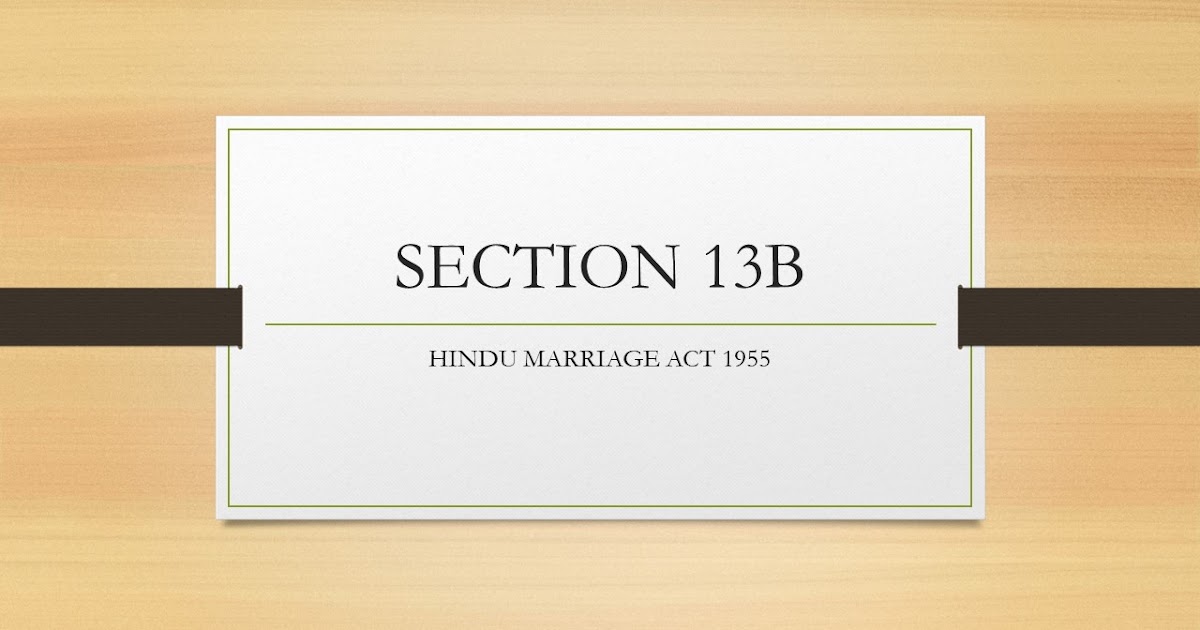


Introduction Section 13B of the Hindu Marriage Act, 1955, provides for divorce by mutual consent. It allows a married couple to dissolve their marriage peacefully when both agree that their relationship is beyond reconciliation. This provision was introduced by the Marriage Laws (Amendment) Act, 1976, to avoid prolonged litigation and emotional distress. Key Provisions of Section 13B 1. First Motion (Filing for Divorce by Mutual Consent) Both spouses file a joint petition for divorce in a family court. They must state that: They have been living separately for at least one year. They cannot live together as husband and wife. They mutually agree that their marriage should be dissolved. The court records their statements and grants a cooling-off period of six months before the final motion. 2. Second Motion (Final Decree of Divorce) After six months, both parties must appear before the court again. If they still consent to the divorce, the court grants the decree, legally dissolving the marriage. If either party withdraws consent, the court cannot grant the divorce. Judicial Interpretation and Landmark Case Laws 1. Cooling-Off Period is Not Mandatory ???? Amardeep Singh v. Harveen Kaur, (2017) 8 SCC 746 The Supreme Court ruled that the six-month cooling-off period under Section 13B(2) is not mandatory and can be waived if the court is convinced that: The couple has been living separately for a long time. There is no possibility of reconciliation. Both parties genuinely wish to separate without further delay. ???? Impact: This judgment made divorce by mutual consent faster and more flexible. 2. Withdrawal of Consent Before the Second Motion ???? Sureshta Devi v. Om Prakash, (1991) 2 SCC 25 The Supreme Court held that either spouse can withdraw consent at any time before the second motion. If one party changes their mind, the court cannot proceed with the divorce. ???? Impact: This ruling emphasizes that mutual consent must exist at both stages. 3. Speedy Divorce in Cases of Irretrievable Breakdown ???? Anjana Kishore v. Puneet Kishore, (2002) 10 SCC 194 The Supreme Court granted divorce in one hearing, without waiting for six months, as the couple had been living apart for more than 10 years. The court used its special powers under Article 142 of the Constitution to do complete justice. ???? Impact: Courts can now grant a quick divorce in exceptional cases. 4. Divorce Granted Even When One Party Delays Proceedings ???? K. Shrinivas Rao v. D.A. Deepa, (2013) 5 SCC 226 If one spouse deliberately delays or refuses consent just to harass the other, the court can intervene. The Supreme Court held that mental cruelty caused by such behavior can be grounds for divorce even under Section 13(1)(ia). ???? Impact: Prevents misuse of the law by one spouse to unfairly prolong the process. Conclusion Section 13B of the Hindu Marriage Act provides a peaceful and hassle-free way to end a marriage. While earlier, the six-month waiting period and the possibility of withdrawal of consent made the process slow, recent judgments have made mutual consent divorce more efficient. Courts now prioritize the intent of the parties and can waive procedural delays when necessary.